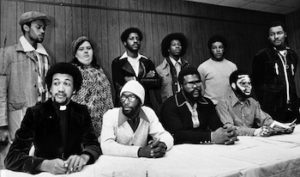
*On this date in 1971, the Wilmington Ten are remembered. Nine young men and a woman were wrongfully convicted in Wilmington, North Carolina, of arson and conspiracy.
On February 6, 1971, a white-owned business, Mike's Grocery, was firebombed. Firefighters responding to the fire said snipers shot at them from the nearby Gregory Congregational Church roof. Ben Chavis and several students met at the church and held other gatherings. The neighborhood erupted in rioting until the next day, when two people died.
The North Carolina governor called the National Guard, whose forces entered the church on February 8 and removed the suspects. The Guard claimed to have found ammunition in the building. The violence resulted in two deaths, six injuries, and more than $500,000 in property damage. Ben Chavis and nine others, eight young Black men who were high school students and an older, white, woman anti-poverty worker, were arrested on charges of arson related to the grocery fire.
Based on the testimony of two Black men, they were tried and convicted in state court of arson and conspiracy and were sentenced to 282 years in prison. Most were sentenced to 29 years in prison, and all ten served nearly a decade in jail before an appeal won their release. The case became an international cause célèbre, in which many critics of the city and state characterized the activists as political prisoners.
The "Ten" and their sentences: Benjamin Chavis (age 24) - 34 years, Connie Tindall (age 21) - 31 years, Marvin "Chili" Patrick (age 19) - 29 years, Wayne Moore (age 19) - 29 years, Reginald Epps (age 18) - 28 years, Jerry Jacobs (age 19) - 29 years, James "Bun" McKoy (age 19) - 29 years, Willie Earl Vereen (age 18) - 29 years, William "Joe" Wright, Jr. (age 19) - 29 years, Ann Shepard (age 35) - 15 years Amnesty International took up the case in 1976 and provided legal defense counsel to appeal the convictions. In 1978, Governor Jim Hunt reduced the sentences of the ten defendants.
In 1980, in Chavis v. State of North Carolina, 637 F.2d 213 (4th Cir., 1980), the federal appeals court overturned the convictions because the prosecutor and the trial judge had violated the defendant's constitutional rights. They were not retried. In 2012, the surviving Ten members were pardoned by Governor Beverly Perdue.